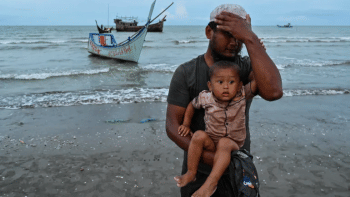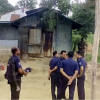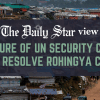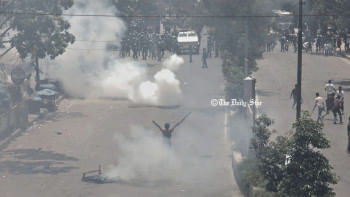Solidarity for refugees and refugee hosts

Over 12 crore people are forcibly displaced by conflict or persecution—across borders or within their countries. Among refugees, three-quarters are hosted by low- and middle-income countries like Bangladesh, which will soon mark the seventh year of hosting nearly one million Rohingya refugees.
This displacement, in the words of UN High Commissioner for Refugees Filippo Grandi, is driven by "the international community's inability to solve conflicts or prevent new ones." In 2017, Bangladesh provided protection to one of the world's most persecuted communities. The generous people of Cox's Bazar were on the ground joined by UNHCR, United Nations, and NGO partners, offering food, clothing and shelter to traumatised Rohingya families.
Some refugee situations are short as in 1971, while others may take longer. The Rohingya yearn to quickly return, but are unable to until it is safe. The international community, especially regional entities, must work towards a political solution and resolution of the conflict. In the meantime, providing protection and support is how states demonstrate solidarity and shared humanity.
Seven years on, we watch in alarm the escalating conflict in northern Rakhine, while refugees await its cessation, anticipating voluntary repatriation to a peaceful homeland. As the warring parties battle for control of the Rakhine state, the inevitable viciousness of conflict is apparent, impacting civilians including the Rohingya. The stateless Rohingya once again have nowhere to go. In May, UNHCR issued a guidance note urging all states neighbouring Myanmar to respect the principle of non-refoulement and allow fleeing civilians access to safety.
While the Rohingya situation is not on the scale witnessed in 1971, memories are evoked of one crore uprooted Bangladeshis seeking asylum with India during the Liberation War. Asylum is universally applicable, enshrined in the Universal Declaration of Human Rights and embedded in state traditions from time immemorial, especially in this part of the world.
Protection includes safety and security while fleeing, and when in the receiving state. Pushback of civilians approaching international borders and deportation/refoulement of those desperately seeking protection with their relatives in Bangladesh's refugee camps are contrary to the shared history of humanity and asylum tradition in South Asia.
I am inspired by the Rohingya community's incredible courage—in the face of historical prejudice and targeted violence and living amidst the impacts of climate change and natural disasters. If the majority lacked basic education and urban skills when they arrived from Myanmar, they are now active participants in education, skills, and community empowerment programmes.
Since 2022, the security situation in the refugee camps has deteriorated—including killings, kidnapping, gender-based violence and child protection incidents. Rival criminal organisations feeding on despair are responsible, persuading refugee youth lacking prospects of livelihoods and education, by force or by lure. The conflict across the border further aggravates security in the camps.
While UN agencies and NGOs have stepped up protection monitoring, and UNHCR intervenes with authorities on all reported incidents, this is not enough. Concerted state action is imperative to reverse the tide of insecurity and protect the vulnerable. With 80 percent women, children and elderly having survived unimaginable trauma, refugee mothers clamour for attention to their plight, demanding a safe environment. A proposed Joint Peace Campaign is raising hopes as efforts commence.
I am inspired by the Rohingya community's incredible courage—in the face of historical prejudice and targeted violence and living amid the impacts of climate change and natural disasters. If the majority lacked basic education and urban skills when they arrived from Myanmar, they are now active participants in education, skills, and community empowerment programmes. Seeking self-improvement, they access online courses, English lessons, vocational trainings; operate community blood drives, camp libraries for women, youth environment groups, and so much more…. Steadily, the Rohingya are building capacity to provide for themselves. They are at the forefront, delivering services in camps, including mental health counselling, manufacturing menstrual hygiene products, documenting camp life through photography and art, fighting fires, and protecting from natural disasters.
Cohesion with local host communities have allowed Rohingya coexistence over the last seven years. Sadly, a new trend of stereotypes and toxic public narrative dehumanises the Rohingya, blaming them for all and sundry woes, whether inflation, illicit yaba trade, climate impacts, and more. "Rohingya" is used as a slur—synonymous with criminals and primitive people. History has shown how dehumanising language, seemingly harmless, can prove dangerous for all concerned. Today, social media and technology further amplify that harm.
The challenges are myriad, but collective advocacy and a common vision have overcome enormous constraints. In 2023, after 33 percent drop in food rations, UNHCR and humanitarian partners sounded the alarm, linking the cuts to increased malnutrition and health risks, as well as child marriage, child labour, and dangerous boat journeys in search of hope. This year, with new funding, the UN World Food Programme (WFP) was able to raise the value of food vouchers twice from $8 to $10 on January 1, and to $11 on June 1. The 2023 funding appeal, too, received higher funding compared to most refugee situations in a year of competing global priorities. The 2024 funding requires collective advocacy and support to sustain the refugees.
Partners are providing Myanmar curriculum classes for children in Grades KG to 10, with Grade 11 beginning this year. In June, 90,000 Rohingya school children took end-of-year learning assessments. Four years ago, there was no formal education for the Rohingya. Today, through advocacy and partnership, girls and boys are enrolled across grades. Through collective efforts, the tree cover in camps has been restored and deforestation for firewood is a memory. Slopes, streambanks, drainage systems, and forests have been rehabilitated by Rohingya volunteers and donor funds.
Local communities and refugees will further benefit from much needed funds that will flow from the World Bank IDA 2020 Window for Host and Refugees. Based on the MoU between UNHCR and the World Bank, aimed at supporting developing economies with large refugee populations, the $700 million grant and extremely concessional loan is key to enhancing the local context. By uplifting refugees alongside its own people, Bangladesh continues a tradition of solidarity and protection, and invests in a vibrant relationship with its Rohingya neighbours when they one day return to a stable Rakhine.
Sumbul Rizvi is the representative of UNHCR in Bangladesh.
Views expressed in this article are the author's own.
Follow The Daily Star Opinion on Facebook for the latest opinions, commentaries and analyses by experts and professionals. To contribute your article or letter to The Daily Star Opinion, see our guidelines for submission.

 For all latest news, follow The Daily Star's Google News channel.
For all latest news, follow The Daily Star's Google News channel. 










Comments